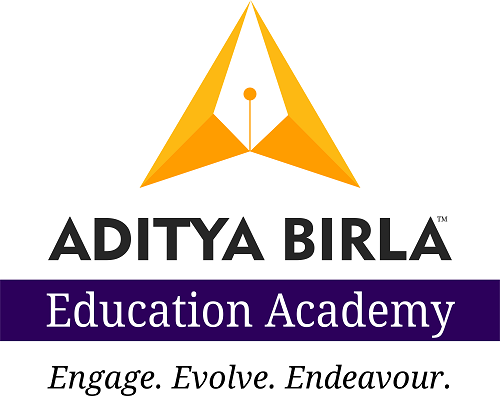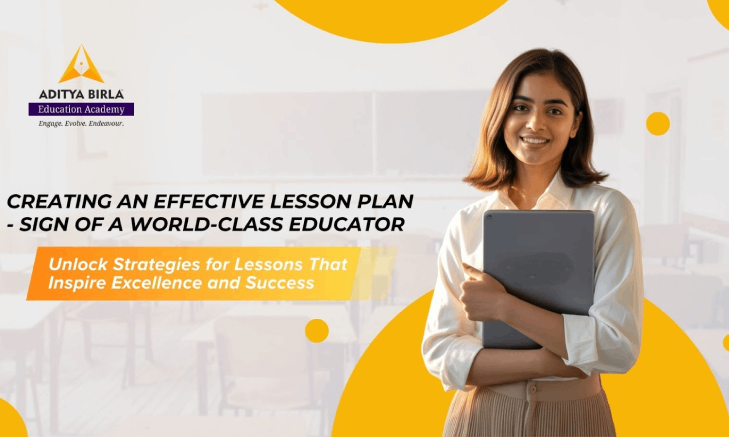In the land of great sages, greater disciples, and the greatest epics, the Indian teaching and learning process has always been a legacy to the entire universe. Many institutions and organisations are doing tremendously good at imparting education to their inclusivity. ABEA, too, has always been at the forefront in creating the entire world as an “Atelier” and teachers as “Atelieristas”. Its many initiatives are the replicators of the knowledge that lies within us to be tapped. To make the teaching learning process equitable (not necessarily equal, which does not always come in terms with the rule of necessity and supply), a Lesson Plan holds unprecedented power; hence, an utmost nuanced approach is needed to create & achieve the desired and intended. A Lesson plan is the most inclusive as well conclusive planning through which objectives are met and reforms are realised. How should we prepare? That is a million-dollar question and deserves to be facilitated.
The first thing first what is a 'Lesson Plan', to a layman it outlines the modus operandi through which a chapter or topic is taught i.e. content, roadmap, strategies, objectives, TAT, time taken, resources, what materials required, assessment and evaluation, in a way a conclusive and inclusive content which is considered 'The Elixir' to the students. Let's dive deeper into what a lesson plan entails in accordance with Bloom's Taxonomy. Certain steps of an inclusive lesson plan are:
- General Information: Name of the teacher, date, topic's name, (Remembering) (Low Order Skill)
- Teaching Aids / Learning Resources: Book, smart board, chalk, duster, or any other required material to avoid unnecessary time consumption. (Remembering) (Low Order Skill)
- Introduction / Set Induction: Before introducing the chapter, kindly set the topic, age, society society-appropriate ambience of the classroom (Understanding) (Low Order Skill)
- Learning Objectives / Learning Outcomes: What students should know or be able to do by the end of the lesson. (Analysis) (High Order Skill)
- Previous Knowledge / Prerequisite: What students already know to bridge the gap (to build a connection with the new topic).(Apply) (High Order Skill)
- Presentation of Content: Step-by-step explanation or demonstration of the topic. Use of teaching methods (lecture, discussion, demonstration, etc.) Interaction with students. Explanation supported by aids (Apply) (High Order Skill)
- Teaching Strategies / Methodology: Methods used to facilitate understanding (e.g., activity-based, inquiry-based, experiential).
(This is often embedded in the presentation.) (Evaluate) (High Order Skill) - Classroom Interaction / Questioning: Not only involving the 'WH' question but also of crossover questions, flipping the question from what should be to what shouldn't or vice versa (Evaluate) (High Order Skill)
- Practice / Application: This is the end goal of every learning wherein we apply, reapply, learn, unlearn, and relearn everything which was taught to us(Create) (High Order Skill)
- Assessment / Evaluation: People generally take both of them the same, don't they? Of course not, assessment is to check the progress and evaluation to judge the progress, one is formative and the other is through & through summative, one talks about journey, the latter talks destination, hence we can’t question the integrity of either, neither should we.
- Recapitulation / Review:This is to weigh the understanding to map it with understanding and creation compatibility (Evaluate)
- Homework / Extension Activity: Enables students to get the required impetus to know their self-worth through the work assigned to them. (Create)
Note: Mentioning the (Low Order Skill) / (High Order Skill) is ensuring ourselves to achieve the journey from bottom to top approach, once we as teachers are convinced enough to integrate the element of learning in 'Lesson Plan it is as if, half the race is won, other half is to be battled, which is upskilling of teachers in making the kind of lesson plan which can serve the purpose. "A good institute" yes, this is what it requires. Birla Institute of Education, with a legacy of almost a century, takes CenterStage with these benign purposes, offering many skill enhancement programmes, aiming at teachers and students, student-centric. It aims not only to the learning gaps, restrictions of the teachers but also their compatibility with every changing demand of students and world at large. Let’s have a kaleidoscopic view, what this institution of repute has to offer.
A. In-Service Training (INSET) Workshops
- Topic-specific, short-duration (≈ 3 hrs) workshops for up to 50 teachers.
- Delivered online or offline to address local needs including NEP-aligned pedagogy, questioning techniques, differentiation, assessment, etc.
B. Capacity-Building Programs for Schools
- Year-long, school-wide professional development service.
- Tailored to institutional needs across early years to senior secondary.
- Covers subject-specific pedagogy, tech integration, assessment strategies, and reflective practice.
C. Milestone Projects
- Project Samarth: A year-long program (60 hours each) to upskill over 2,248 English-medium BMC teachers in English, Science, Math, Social Studies; includes collaborative, tech-based NEP‑aligned pedagogy. Delivered by ABEA trainers.
- Project Oorja (in partnership with Mpower): Focused on mental health literacy, counselling interventions, and teacher training in 1,138 BMC schools involving ~10,420 teachers over three years.
D. Free Masterclasses & Educator Meetups
- Since April 2020, ABEA has offered monthly free sessions on emerging educational themes (e.g., Gen‑Z learning, leadership, assessment design, global citizenship).
- Reached over 100,000 educators across India through ~60 free sessions by mid‑2021.
Other Trust-Led Initiatives
- Mpower: The Trust‑backed mental health initiative integrated into Project Oorja, supporting counsellor-driven mental health literacy and interventions in schools.
Why Does A Good Lesson Plan Matter?
It is always a thoughtful and insightful decision to choose. Choosing the best should not be an option but a habit when it comes to build the 'Better We'. The world has entrusted the teachers to train the hopes, aspirations, emotions, passions, people, societies, and the globe at large. A simple act of lesson planning brings ‘Seismic but Sparse’ change, hence warrants a deep, guided, and nuanced approach. Making lesson planning is must, its importance cannot be understated. The more scrutinised, deep, guided, and well-intended lesson plan you make, the better results in terms of achieving the all-inclusive nature of learning are achieved.
FAQ's
Q1. What makes a lesson plan truly effective in a modern classroom?
An effective lesson plan is intentional, structured, goal-oriented, and aligned with clear learning outcomes. It considers student readiness, teaching strategies, assessment methods, and pacing. A strong plan ensures clarity, flow, and predictable learning progression.
Q2. Why is lesson planning essential for world-class teaching?
Lesson planning provides direction, reduces uncertainty, and increases instructional impact. It ensures the teacher has clarity on objectives, teaching methods, differentiation needs, and assessment checkpoints—leading to more confident delivery and better learning outcomes.
Q3. What are the core components of a high-quality lesson plan?
Essential elements include general information, learning objectives, prior knowledge, teaching aids, instructional steps, questioning strategies, practice tasks, assessment, and review. These components ensure a complete and coherent learning experience.
Q4. How can teachers write strong learning objectives for a lesson plan?
Learning objectives should be measurable, student-centred, and aligned with Bloom’s Taxonomy. Using action verbs such as identify, explain, analyse, and create helps teachers articulate expected outcomes clearly and track student progress more effectively.
Q5. How does Bloom’s Taxonomy improve the quality of a lesson plan?
Bloom’s Taxonomy provides a structured framework for organising teaching from lower-order thinking (remembering, understanding) to higher-order skills (analysis, evaluation, creation). This ensures lessons are academically rigorous and support deeper learning.
Q6. What are common mistakes teachers make when creating lesson plans?
Common issues include unclear objectives, overly long content sections, lack of differentiation, missing assessment indicators, and ignoring student readiness. Skipping review and reflection also weakens the overall learning cycle.
Q7. How can teachers integrate assessment effectively within a lesson plan?
Assessment should be embedded throughout the lesson using techniques like questioning, observation, exit tickets, peer checks, and short formative tasks. This helps teachers identify misconceptions early and adjust instruction in real time.
Q8. How can teachers design lesson plans that support diverse learning needs?
Differentiation can include varied instruction methods, simplified language, scaffolded tasks, visual aids, flexible grouping, and enrichment options. A well-planned lesson anticipates diverse abilities and ensures every learner can access the content.
Q9. What strategies help ensure smooth classroom flow during a lesson?
Clear transitions, predictable routines, time-bound activities, and consistent expectations help maintain pacing. Including buffer moments and alternative tasks for early finishers ensures a seamless, low-disruption learning environment.
Q10. How can teachers use questioning techniques to deepen learning?
Effective lesson plans include a mix of open-ended, probing, reflective, and higher-order questions. Using “why,” “how,” and “what if” prompts encourages critical thinking and helps gauge understanding across the class.
Q11. Why is reflection an important part of lesson planning?
Reflection helps teachers evaluate what worked, what didn’t, and what needs improvement. It promotes continuous growth and ensures future lessons become more refined, intentional, and aligned with learners’ needs.
Q12. How does ABEA support teachers in mastering lesson planning?
ABEA offers training that strengthens planning skills through research-based frameworks, Bloom-aligned methods, practical workshops, and hands-on guidance. Teachers learn to design purposeful, inclusive, and high-impact lesson plans suited for modern classrooms.







